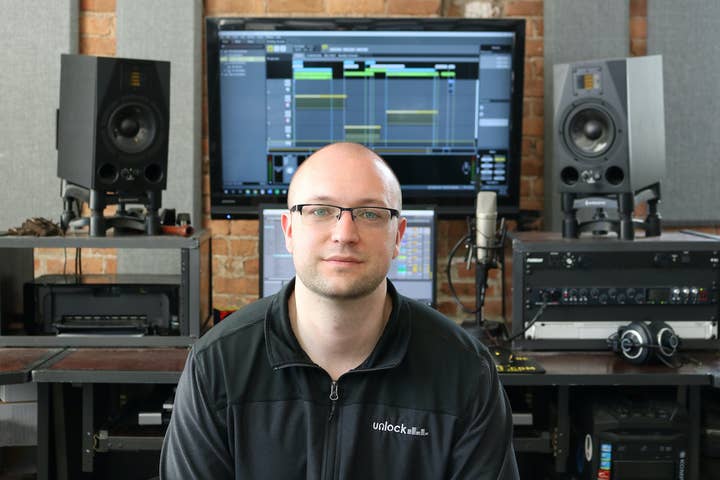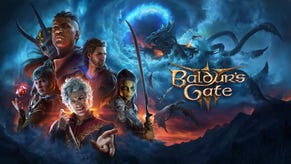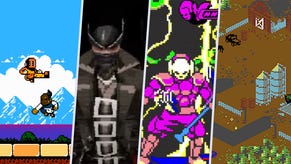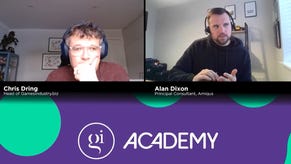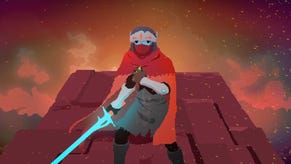Three community-led ways to promote equity and make better games
Collaboration, accessibility, community: Elliot Callighan explores ways indie and mid-sized developers can lead the charge for equity
When it comes to building diehard communities, video games are hard to beat. From corner penny arcades to home consoles and online play, games have always brought people together. So much so, that the gaming community now boasts nearly three billion gamers of all stripes-all connected by love for immersive entertainment.
That power to connect always resonated with me. As a musician, it's what drove me to explore new styles and techniques of sound design and compose original music for games to communicate the intangible. It also inspired me to found Unlock Audio and partner with mid-size and indie developers-the very people who I believe will set new examples for artistic achievement and equitable game development (something many gamers have come to seek).
The game industry is full of diverse voices that often don't have a clear path to be heard
To serve my team and partners best, I sought to uncover what matters to developers and players most by researching a new business model for game audio. From this research process, we realized that the game industry is full of diverse voices that often don't have a clear path to be heard, and that leadership amongst smaller teams can take the first steps to lift up their coworkers and broaden that path, changing the creative process and promoting better practices for the whole industry.
By sharing what I've learned so far, I hope our industry can champion greater equity from the ground up. I believe doing so is essential for unleashing our greatest creativity, building stronger partnerships, and pushing the limits of how deeply people love what we create together.
1. Demolish silos to fuel creative passions
The freshest and most cohesive gaming experiences are made when collaboration reigns. Silos, when departments operate in complete isolation from each other, are often a hindrance to game development. Art, story, sound, and gameplay work better when they evolve together, free of disciplinary segregation and egos. After all, exciting new ground is hard to reach when departments stick to their lanes, and strict development divides only serve to create tensions that can emerge in the final product. The same can be said for social and cultural silos.
Diversity of thought and experience only expands our creative potential, and uncovers more opportunities to inspire deep and widespread connections with our games. Even solo creators can benefit from escaping their own personal silos and finding a creative sounding board to test and improve their ideas for their game and audience.
Silos, when departments operate in complete isolation from each other, are often a hindrance to game development
By breaking down these barriers, passions and drives will lead to greater studio output strength. Without silos, development becomes an exchange of much more than expertise-allowing a broader range of perspectives to be embraced through a holistic lens-thereby lending equity and refinement to the process, product, and its contributors alike.
Ridding development of these superficial limitations is an essential step, and one best taken quickly to realize full creative potential.
As an audio partner, I know my team can contribute best when we're involved early -- ideally at onset -- and remain engaged until project completion. This allows all partners to feed on the many passions at play and truly understand the vision of the game and what's necessary to deliver the best experience for its audience.
When all partners and disciplines can work closely and constantly together around a shared vision, conceptual divides and tensions begin to fade. That's not to say discipline experts can't or shouldn't lead from their own experience, but deep collaboration is the true key to reconciling our many diverse references and building better overall games.
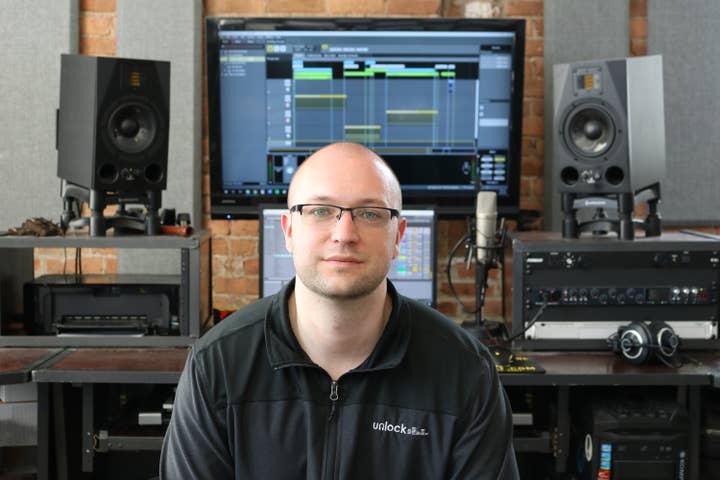
2. Measure accessibility from all angles
Accessibility in gaming is more than a checklist of removing or adding certain content to create game modes for specialized player needs. It's also a matter of empowering players to invite others in and share their experiences together. The key to accessibility is in stronger partnerships where holistic teams of sound folks, artists, programmers, and developers prioritize accessibility in every form and are proactive in dealing with obstacles together along the way.
The need for accessibility is captured well in the meteoric rise of live streaming, as more and more gamers broadcast their playthroughs and involve diverse audiences along the way. The last thing streamers want is for elements of their game to hinder their ability to share and cultivate community.
The key to accessibility is in stronger partnerships where teams prioritize accessibility in every form and are proactive in dealing with obstacles together along the way
A game might have the most groundbreaking audio-visual feedback, impactful voiceovers and dialogue, and impressive gameplay, but if it prevents players from being able to share freely, it fails to be accessible. For instance, restrictions with licensed assets can place players' public channels in the crosshairs of protective copyright owners. But when creativity and originality reign, there's no limit to how developers can promote greater accessibility and community-building.
Games are both art and entertainment, and their development can get messy, complicated and convoluted fast. Having to worry about what assets we can or can't use for certain regions, platforms and time periods stifles not only creativity, but also accessibility and the ability to build a thriving player community.
Realizing the limitations indie and AA developers face, it's easy to understand why less robust approaches to game experiences, especially audio, are commonplace, but having a multidisciplinary team available can round out these experiences by providing an extensive, shared expertise instead of requiring one or two people to be capable in six or even more disciplines.
The greater bandwidth these teams provide also make it possible to act upon the needs of your entire audience rather than only the largest group. Including accessibility modes promotes inclusivity, expands your reach, and gives even greater meaning and impact to the games we create.
Including accessibility modes promotes inclusivity, expands your reach, and gives even greater meaning and impact to the games we create
Visually, this may include modes for color blindness or other measures to protect players with photosensitivity. Audibly, you can increase accessibility for people with hypersensitivity by including alternate sound mixes for lower density. However, merely reducing fidelity to achieve this without concern for the end result can leave a game feeling underproduced and subtract from its immersive potential.
Achieving accessibility while still expressing the original vision of the developer is a creative balancing act with many things that could go wrong. Making a game at all is challenging. Adding these additional considerations on top of the already complex development process can be daunting. Relying upon collaborators with unpredictable cost, limited skill sets, reduced bandwidth, and other limitations to achieve accessibility and artistry does not promote success in either. Accessible modes matter, just like the people they are created to accommodate -- and the gaming community notices if we care.
3. Exceed community expectations as a team
As a community, gamers do a great job of looking out for each other, just as they do a great job of digging into every detail of their favorite properties -- both in front of and behind the scenes.
Developers are part and parcel with the gamer community at large, which is why players want to know their favorite creators are treated fairly. For instance, it's easy to overlook the value of collaborative talent to fans in the flurry of promotions before launch, but something we do is tag and promote the many voice personalities involved. It's so simple, but it gives gamers another litmus test for the integrity at play behind the scenes of their potential new games and a greater connection and appreciation for their creators. Something as simple as that can cut through the noise and elevate the conversation above the litany of recent disappointing industry headlines.
With great hype comes greater disappointment when things don't go according to plan. Let readiness dictate your message
We've seen studios and publishers making huge promises, then failing to deliver on the expectations they've set, despite extra, often mandated, effort by their staff. This try-hard posturing stems not from optimism or aspiration, but from prioritizing competitive appearances over simply creating a great game. It's better to do great work and fulfill promises before-not after-release, and to engage and communicate with a community that is interested in what you're creating.
With great hype comes greater disappointment when things don't go according to plan, causing fans to feel lied to or even betrayed. Let readiness dictate your message and earn your hype and trust with a game that exceeds the expectations of your community on release.
Managing these expectations isn't easy. Games evolve a lot throughout their lengthy development cycle. Original concepts take on new forms. Even innovative gameplay ideas can remain just beyond reach without the right technology at play. Collaborations and business agreements need to cater to this reality instead of stifle it. This growth and transformation is part of any game's story, and players are eager to follow that journey if they know decisions are being made with integrity and the intent to do what's right both for them and for the creative minds behind the work.
Players have raised the stakes -- now change must come from within.
For today's gamers, the enjoyment they find isn't only a matter of what you make but how you make it. Stories about the breakthroughs and successes of deep and unrestricted collaboration, driven by processes that reflect a profound respect for all involved in development and all who play (a byproduct of equitable development), give players more reasons to fall in love with the worlds and experiences of games as well as respect and admire those who create them.
This change is not going to be without great effort, but I believe mid-sized and indie developers are poised to lead the way toward change for the better. Equity in game development starts with how we work together and rise to meet the standards and values put forth by our broad community of players. Their trust, engagement and devotion depends on it.
Elliot Callighan is a composer and sound designer, and the owner of Unlock Audio. He is also a Captain in the Army National Guard and teaches music and audio curriculum as adjunct faculty in the game and film programs at DePaul University in Chicago.
